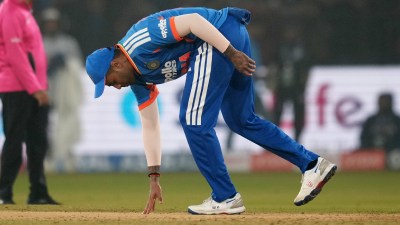quot;Hockey has become more cerebralquot;
New Delhi, February 6: Glenn Freeman is an unabashed admirer of Asian style of hockey. The doughty defending and fast-break attacks that typ...

New Delhi, February 6: Glenn Freeman is an unabashed admirer of Asian style of hockey. The doughty defending and fast-break attacks that typify the European style of play are quot;effectivequot;, but hold quot;little charmquot; for this middle-aged coach who is here with the Australian Universities team for the Nehru Champion Colleges hockey tournament.
Like most modern coaches, Freeman is a staunch supporter of the quot;no off-sidequot; rule. quot;It has made the game more difficult, but more attractive at the same time. It is more of a cerebral sport now,quot; he says.
He does not believe that the new rule will benefit one style of play and stifle the other. quot;How you adapt to the rule is important. You just have to mould it according to your style. If you don8217;t, you will lose your way in the the midfield 8212; which is the key area. As far as I8217;m concerned, it is all up there,quot; he raises his finger to his temple.
quot;You8217;ve got to keep improvising all the time. We Australians have shown how to mix the two: European in defence and Asianstyles in attack, to get goals.quot;
Freeman believes that India and Pakistan can once again rise to the top. quot;That will be good for the game. It was obvious at the Adelaide Champions Trophy that the Europeans Germany and the Netherlands rely only on penalty corners to win matches. That is not the true spirit of hockey.quot; says Freeman.
The Australian team8217;s visit has materialised due to the perseverance of the team manager Stephan Baldanoff. He was struck by the discerning hockey fans and warm hospitality when he visited India as a member of the Monash University Melbourne hockey team seven years ago.
quot;India8217;s rich culture and the Indians8217; passion for hockey was something I could not erase from my memory. I had to come back,quot; the young, bespectacled manager says.
Even after he stopped playing in the Australian National Hockey League, Baldanoff kept himself involved with the game at the University level. quot;I decided last year that we should send a Combined Universities team to India, and I wrote to theAssociation of Indian Universities,quot; recalls Baldanoff.
The Indians reacted positively, and after a year8217;s correspondence the Australians are finally here. The team was picked from eight universities from across Australia, comprising several players who play in the National League. And their mission: quot;Play and learnquot;.
About the team, Baldanoff says, quot;These boys are professionals and play at the highest level. We thought it would be a good idea to give them international experience and also help them widen their horizons,quot; the manager points out.
The 16-member squad has two players who have been in the reserves for the National side. Forward Jac Howes from Canberra University plays for the professional side Canberra Lakers and has been in the National camp. Midfielder Aaron Oman has been in the Australian Development side and awaits the chance to play for the National side.
Freeman had no idea about what was in store in India. He got hold of video tapes of India8217;s matches at the Junior World Cup inMilton Keynes England. quot;I had not seen the Indians play; just a few matches on television. Hence I did not know what to expect. I just told the boys look and see8217;, and it worked out pretty fine. We will definitely improve as the tour progresses,quot; Freeman said after winning the match against Aurobindo College today.
- 01
- 02
- 03
- 04
- 05































